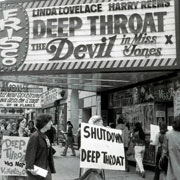 |
 |
 |
 Entertainment | February 2005 Entertainment | February 2005  
'Inside Deep Throat' May Surprise You
 Mike Clark - USA TODAY Mike Clark - USA TODAY

Infamous, X-rated Deep Throat, which sparked as much 1972 water-cooler discussion as The Godfather, is said to have returned $600 million on a $25,000 investment. But now there are added wonders that refuse to cease.

 Inside Deep Throat, an NC-17 documentary that deftly chronicles the fallout with about 15 seconds of hard-core footage has some surprise credits. It's produced by Brian Grazer, who has A Beautiful Mind and The Cat in the Hat on his résumé. And it's directed by Fenton Bailey and Randy Barbato, who did 2000's The Eyes of Tammy Faye (as in Bakker). Inside Deep Throat, an NC-17 documentary that deftly chronicles the fallout with about 15 seconds of hard-core footage has some surprise credits. It's produced by Brian Grazer, who has A Beautiful Mind and The Cat in the Hat on his résumé. And it's directed by Fenton Bailey and Randy Barbato, who did 2000's The Eyes of Tammy Faye (as in Bakker).

As with Tammy Faye, the filmmakers have a subject with certain Looney Tunes aspects, starting with the fact that Deep Throat filmmaker Gerard Damiano was a family-man/hairdresser who sensed that the line between hard-core porn and bona fide movies was about to shrink.

This trip down memory lane seems to have no agenda and treats principals on both sides of the conflict with respect, starting with Damiano, star Linda Lovelace (who died broke in 2002) and prosecutor Larry Parrish. The last tried to end pornography by trying to bust Throat's male lead, Harry Reems, now a born-again Utah real estate agent and one of the documentary's most dignified interviewees.

Questions such as Lovelace's claim that she was forced to make the film at gunpoint and the film's Mob ties are addressed. But, on the other side, look at the moralists we see heaving stones: Richard Nixon before his impeachment; Roy Cohn before his disbarment; and Ohio's famed anti-smut crusader Charles Keating, pre-S&L scam.

Weighing in with more recent opining are Norman Mailer, Gore Vidal, Erica Jong, Helen Gurley Brown (a stitch) and Dr. Ruth Westheimer. Filmmaker John Waters notes that Deep Throat didn't incite in-theater masturbation when it caught on with the masses. After all, he says, you might be sitting next to Angela Lansbury.

The movie changed society. Bob Woodward and Carl Bernstein co-opted its title for their anonymous Watergate source, and Bob Hope and Johnny Carson alluded to it in their monologues. The Carson link is especially interesting, given sidekick Ed McMahon's comment that if libraries could exhibit the host's nightly monologues, students would get a sense of what past decades were about. Something like that happens with this movie. It reminds us: There really are socio-archival treasures out there. | 
 | |
 |



